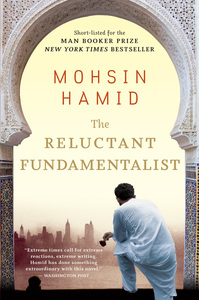Take a photo of a barcode or cover
emotional
funny
informative
reflective
tense
fast-paced
Plot or Character Driven:
Character
Strong character development:
Yes
Loveable characters:
Yes
Diverse cast of characters:
Yes
Flaws of characters a main focus:
Complicated
medium-paced
Plot or Character Driven:
Character
Strong character development:
Yes
Loveable characters:
Complicated
Diverse cast of characters:
Yes
Flaws of characters a main focus:
Complicated
A tightly and very well written monologue. It's the story of a young Pakistani man coming to America on an Ivy League scholarship and then moving on to glittering success in Manhatten, only to have his core shaken by what happened on 9/11.
Changez is sitting at a restaurant in Lahore, Pakistan, with an unknown American. It is a few years after 9/11 and Changez is telling this stranger about the time he spent studying and working in America. Changez talks about his experiences with love, culture and a growing nostalgia for his home that eventually persuaded him to return to Lahore.
I read this book in one day. I found the way it was written to be really compelling. It’s written as a conversation between Changez and the stranger but the stranger never speaks.
I read this book in one day. I found the way it was written to be really compelling. It’s written as a conversation between Changez and the stranger but the stranger never speaks.
emotional
reflective
tense
medium-paced
Plot or Character Driven:
Character
Strong character development:
Yes
Loveable characters:
Yes
Diverse cast of characters:
Yes
Flaws of characters a main focus:
Yes
Written in an unusual style. Short, concise and masterful. Convers complex issues in such a forthright way. Highly recommend
emotional
reflective
medium-paced
Plot or Character Driven:
Character
Strong character development:
Yes
Loveable characters:
Complicated
Diverse cast of characters:
Yes
Flaws of characters a main focus:
Yes
dark
reflective
tense
fast-paced
Plot or Character Driven:
Character
Strong character development:
Complicated
Loveable characters:
Complicated
Diverse cast of characters:
Yes
Flaws of characters a main focus:
Yes
Absolutely loved it. It's not what I expected from the title, it's even better. The book is very subtle and takes its time to build the main character. I loved the double love triangle, not only with persons (Erica and Chris) but also with countries (America and Pakistan). It's a nice parallel. It does take some time to settle: I'm not sure yet what this book did with my views of the world. But I'm sure it will do something.





